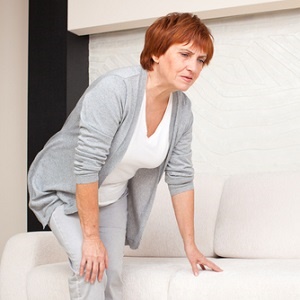
Oestrogen is the hormone that protects you against osteoporosis, cardiovascular disease and the external signs of ageing. Without oestrogen, it’s just a matter of time before you’ll start experiencing conditions such as atherosclerosis and osteoporosis, both of which are potentially lethal.
Menopause is, therefore, a signal to have a thorough medical check-up. Your doctor will help you to detect potential health problems before they occur and/or treat existing conditions before they become more serious.
Menopause and your bones
Osteoporosis can be a serious, long-term health consequence of menopause. It’s a silent disease until your bones become so weak that a sudden strain, bump or fall causes a fracture or a vertebra to collapse. Oestrogen deficiency accelerates the bone depletion that occurs during the normal ageing process, and about 25% of women gradually experience bone fragility and fractures.
Collapsed vertebrae may initially be felt or seen in the form of severe back pain, loss of height, or spinal deformities such as stooped posture.
Bone loss in the femur bones occurs at a slower rate, and women who take menopausal hormone therapy (MHT) may not experience femur fractures until 70-75 years.
Hip fractures, in turn, are a common injury in women with osteoporosis at an advanced age. About 20% of Caucasian women at the age of 80 who don’t take MHT may develop hip fractures and usually require a long recovery period. Up to a quarter of those who do recover need to enter a long-term care facility, while 15% of women with hip fractures in this age group will die within six months – either from the fracture itself or from complications.
It’s been proven that oestrogen replacement therapy can slow and treat the development of osteoporosis.
Menopause and your heart
After menopause, the risk of a heart attack rises steadily. Generally, the incidence of heart attacks rises in both sexes with advancing age but the rate of increase is greater in women older than 50 than in men. As a result, the ratio of heart attacks in women to men after 50 decreases to 2:1 by age 65 and 1:1 by age 80. In addition, the first heart attack is more likely to be fatal for women than for men.
Oestrogen decrease is thought to cause unfavourable changes in cholesterol levels and other blood fats, as well as in fibrinogen, a substance that affects blood clotting. These changes may increase the risk of heart disease and stroke.
Heart disease is a leading cause of death among women. Part of the reason could be that women are taken less seriously when they arrive at the emergency unit with chest pain. Fortunately, however, most doctors now know that women may present with different patterns of chest pain than men, and that they should be assessed for a heart attack.
Menopause, fat distribution, muscle mass and skin
With increasing age and a decline in oestrogen levels, muscle mass decreases, body fat increases and skin collagen gradually becomes thinner and less elastic.
The increase in body weight and total body fat that many women experience is associated with a shift of fat: from the peripheral sites of the body to the abdomen. In some women this causes a change in shape from the more gynaecoid (female-like) to the android (male-like) fat distribution, which is thought to carry an increased risk for cardiovascular disease.
Other changes include:
- Changes to the breast tissue. The glandular tissue becomes less and is replaced by fat.
- Skin changes. As oestrogen levels decline, skin collagen gradually becomes thinner and less elastic. This causes sags and wrinkles. The skin also becomes drier.
- Hair loss. Oestrogen stimulates hair growth. When oestrogen levels fall, hair growth slows down and the hair becomes thinner and less manageable.
- Dental problems. Decreased levels of oestrogen can lead to tooth loss, gingival bleeding and inflammation, and loosening of the teeth. Tooth loss could also be due to an underlying bone disease such as osteoporosis.
Menopause and your brain
Oestrogen has definite effects on the functioning of the brain. It affects the blood flow to the brain, growth and survival of nerve cells, and the way in which impulses are transmitted along nerve cells.
Low levels of oestrogen have been linked to a decrease in mental abilities and alertness. This includes worsening short-term memory, disturbances of cognitive function, and going blank during sentences.
Menopause and fertility
As the number of eggs in the ovaries is reduced and ovulation becomes irregular, the ability of perimenopausal women to conceive decreases. However, pregnancy is still possible. Use contraception until you’ve had 12 period-free months if you don’t plan to conceive.
When to see a doctor
Consult your family doctor or gynaecologist for routine check-ups and advice about the above-mentioned conditions. This is especially important if you have a personal or family history of heart disease and/or osteoporosis.
Call a health professional without delay if:
- You have prolonged, irregular bleeding. This may be particularly important if you’re overweight.
- You experience bleeding after not having had a period for six months or more. Among other possibilities, it may be a sign of uterine cancer.
- Mood changes are causing problems. If depression is severe or persists for more than two weeks, consult your doctor.
Reviewed and updated by Dr Carol Thomas MBChB (UCT) FCOG (SA) MMed (O&G) (UCT), specialist gynaecologist in private practice, Cape Town, President of the South African Menopause Society and Director of the WomanSpace and iMobiMaMa. March 2017.




 Publications
Publications
 Partners
Partners
















